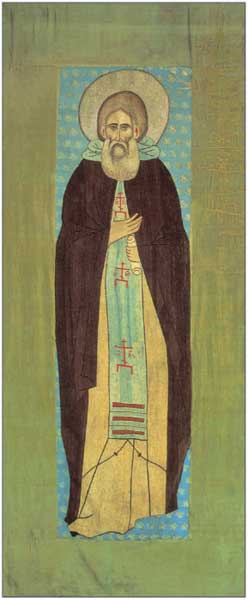The Holy Trinity-St. Sergius Lavra
 |
“In the land of Moscow and all over the world there is no other monastery equal to this one…” Archdeacon Paul of Aleppa St. Sergius, the founder of the Holy Trinity Lavra, was born of wealthy Rostov boyars on May 3, 1314. On the fortieth day the local priest baptized the child, naming him Bartholomew. From his childhood he grew accustomed to solitude and sought his salvation through prayer, fasting and work. In 1337, at the age of 23, after his parents’ death, he decided to leave for the desert together with his elder brother Stephen. The brothers chose to found their hermitage in a clearing surrounded by thick forest on a low hill, later called Makovets (a term often used to indicate the top of a hill). They built for themselves a cell and a small church, which they dedicated to the Lifegiving Trinity. That was the birth of the monastery, which later served as a source of pride and inspiration to the people of Russia. The life of a hermit was very difficult and required a good deal of perseverance and will. Stephen could not take the rigours of winter and the scarcity of food. He preferred life in an urban monastery and left Bartholomew for Moscow. For about two years Bartholomew remained alone in the desert, and in silence and prayer he prepared himself for his monastic vows. After taking them with the name of Sergius, he lived even more austere ascetic life in solitude, reading the Bible, working in his garden and unceasingly praying. Despite the distance of his hermitage, word concerning the exemplary ascetic life of St. Sergius soon spread everywhere and pious monks began coming to him in search of guidance. Later farmers and city dwellers used to come from all over for St. Sergius` blessing and advice and the n settled in the area of the monastery. The Mongol yoke, which weighed heavily on the country, caused its ruin and forced people to leave the most exposed regions and seek refuge in the wilderness. |
| << | 1 2 3 4 5 6 7 8 9 10 | >> |
Разработка сайта - компания Омнивеб
© 2000-2026 Свято-Троицкая Сергиева Лавра


